Duke of Westminster, Gerald Cavendish Grosvenor, dies aged 64
- Published
The Duke of Westminster in his own words
Billionaire landowner and philanthropist the Duke of Westminster has died aged 64, his family said.
Gerald Cavendish Grosvenor died at the Royal Preston Hospital in Lancashire on Tuesday after suddenly becoming ill on his Abbeystead Estate.
The duke's fortune was estimated at $10.8bn (£8.3bn) by Forbes magazine, making him the world's 68th richest person and the UK's third.
A friend of the Royal Family, he became the sixth Duke of Westminster in 1979.
'Privacy'
He had four children including his only son, Hugh Grosvenor, 25, who is heir to the dukedom and also Prince George's youngest godfather.
Giving news of the duke's death, a spokeswoman said: "His family are all aware and they ask for privacy and understanding at this very difficult time.
"No further comment will be made for the time being but further information will follow in due course."
A Lancashire Police spokeswoman said officers were called at about 17:00 BST on Tuesday and made aware of the death of a 64-year-old man at Royal Preston Hospital.
"He was airlifted to hospital after he had been taken ill whilst walking in the Trough of Bowland. There are no suspicious circumstances and a file will be passed to the coroner," she added.
Among properties across the UK, he owned 190 acres in Belgravia, an area near to Buckingham Palace, and one of London's most expensive districts.

The new Duke of Westminster
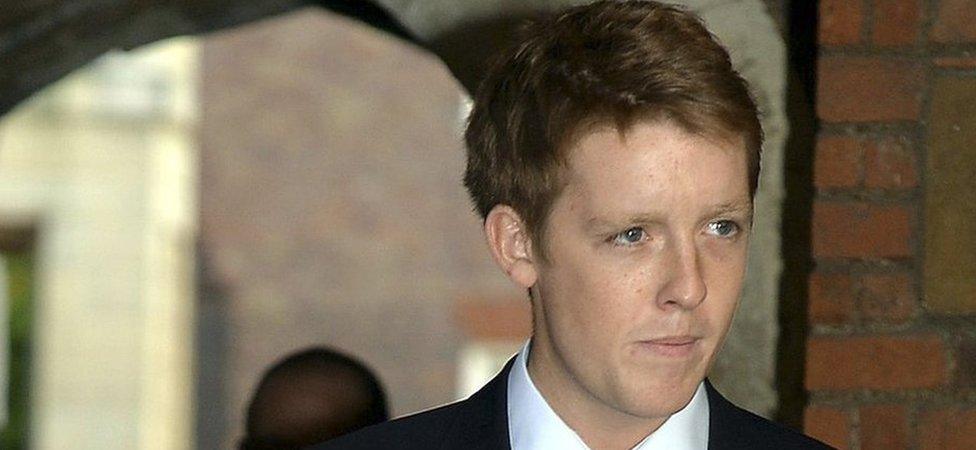
The sudden death of billionaire landowner and philanthropist the Duke of Westminster means his 25-year-old son Hugh has now inherited an estate worth £9bn.
Hugh Richard Louis Grosvenor, previously known by the honorary title Earl Grosvenor, works as an account manager for Bio-bean, a green technology company.
In January 2012 the duke threw a lavish 21st birthday party for 800 guests - dress code "black tie and neon" - which has been estimated at costing £5m.

A Buckingham Palace spokeswoman said: "I can confirm that Her Majesty the Queen is aware of the news about the Duke of Westminster.
"A private message of condolence is being sent by the Queen and the Duke of Edinburgh."
The Prince of Wales and Duchess of Cornwall were "deeply shocked and greatly saddened" by the sudden death of their friend the Duke of Westminster, a Clarence House spokeswoman said.
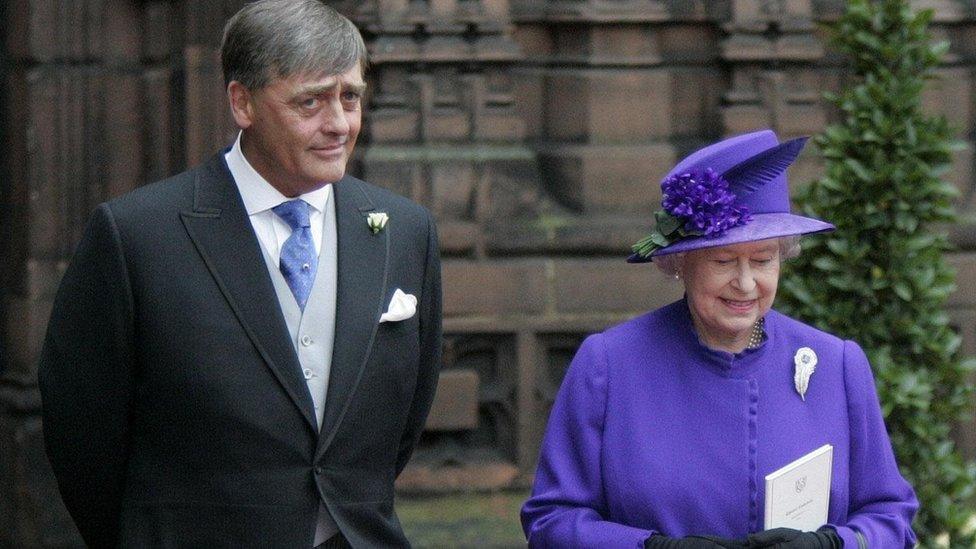
The duke pictured with the Queen in 2004 following the wedding of his daughter Lady Tamara Grosvenor and Edward van Cutsem in Chester
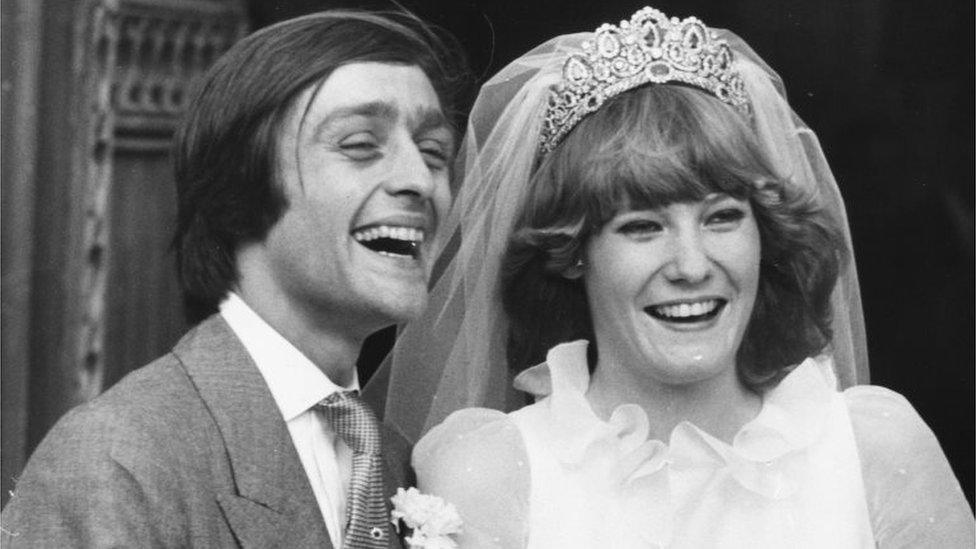
The duke married his wife Natalie Phillips in 1979, and the couple had four children
The Grosvenor family accrued much of their London wealth through the marriage of Sir Thomas Grosvenor to the heiress Mary Davies in 1677.
According to the Oxford Dictionary of National Biography, external she brought Grosvenor "the estates which would become the cornerstone of the family's later wealth".
The estates were described as Ebury farm, east of Chelsea, and a large holding between Tyburn Brook and Park Lane in central London. Today these are part of the wealthy Belgravia and Mayfair districts.
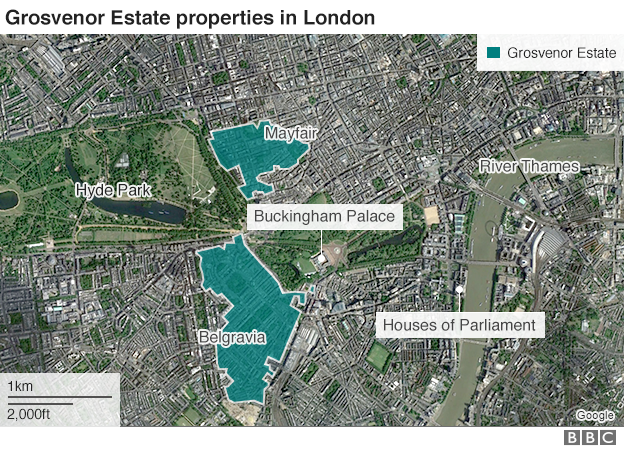
The country seat Eaton Hall in Cheshire has been home to the Grosvenor family since the 15th century.
Strong views
The duke was born in Omagh and spent his early years in Northern Ireland.
He was educated at Harrow School, where he gained two O-levels, but once said that "academic studies came very low down on the list of priorities... games were very much my first priority".
The duke even had trials at Fulham FC, but his father is said to have disapproved of football as a career choice for an aristocrat.

UK rich list
Hinduja family - industry, £12.8bn
David & Simon Reuben - investment/real estate, £8.8bn
Duke of Westminster - real estate, £8.3bn
James Ratcliffe - chemicals, £5.1bn
Philip and Cristina Green - retail, £4.3bn
Source: Forbes, external

He later worked on ranches in Australia and Canada before serving an informal apprenticeship in property management.
The duke abandoned his dream of a career as a soldier in 1973 on becoming trustee of the Grosvenor Estate aged 27, but signed up to the Territorial Army and in 1994 was made an OBE for his work in the volunteer force.
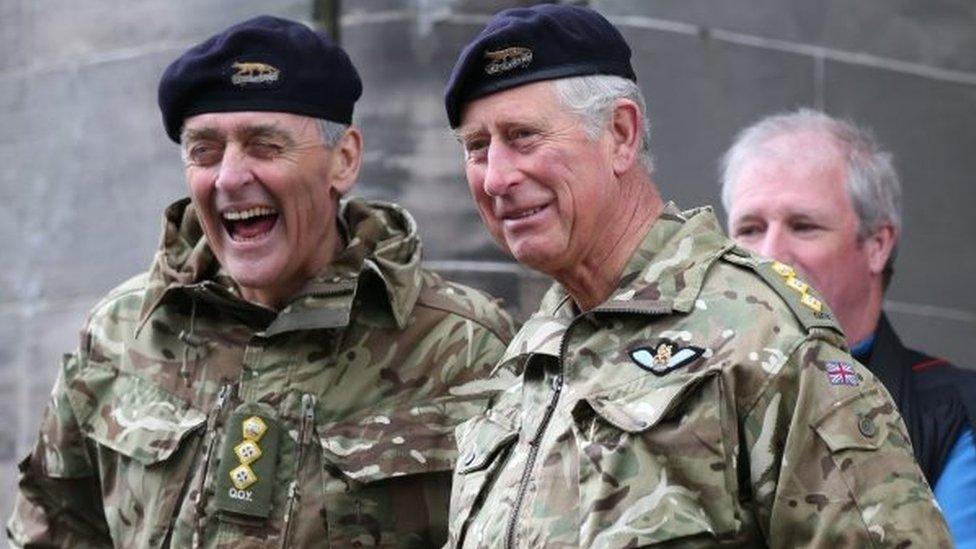
The Prince of Wales said he was "greatly saddened" by the death of his friend
The duke was known for his strong views, and was an advocate of change in the Lords.
He quit the Conservative Party in 1993 after it proposed the Bill on Leasehold Reform, which would have had a huge effect on his massive London landholdings.
He also paid thousands to some of his workers to help them meet the poll tax, introduced by Margaret Thatcher, which he described as "insufferable".
The Duke of Westminster has died at the age of 64
The duke also insisted that he would "rather not have been born wealthy", and once said his life would have been easier if he had sold his estate to live in the Bahamas.
However, he went on to say that he could not do that because it "would not be responsible".
In 2000, he revealed he had suffered a nervous breakdown and that he had been overcome with depression in 1998, following the pressures of running his businesses and making 500 public appearances a year.

Global properties
The Grosvenor Estate is an international property portfolio, which manages assets of £11.8bn in more than 70 cities.
These include:
Eaton Square, Belgravia, London
Parts of Mayfair in London
Parkside Place, 99 apartments in Cambridge city centre
Westminster Terrace, a 33-storey tower in Hong Kong
Retail, office and residential properties in Vancouver
Grosvenor Place Kamizono-Cho, a residential block in Tokyo
Source: Grosvenor.com, external

The duke credited himself with using his wealth responsibly and gave financial support to both rural and inner-city areas with links to his estate.
The Westminster Foundation, which manages the estate's charitable giving, has donated to more than 1,500 charitable organisations since 1974. The Duke was also president of the Royal National Institute of Blind People for 25 years and president of the St John Ambulance for 10 years.
In an appearance on BBC Radio 4's Desert Island Discs in 1995, the duke's favourite track was Albatross by Fleetwood Mac and his luxury item was a telescope.